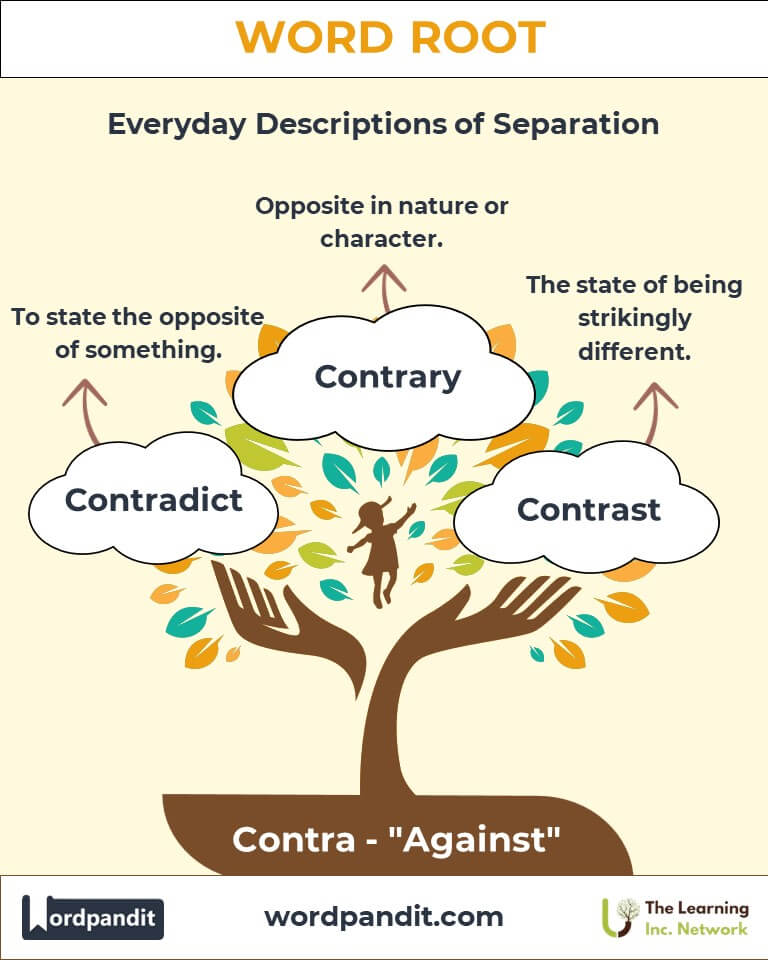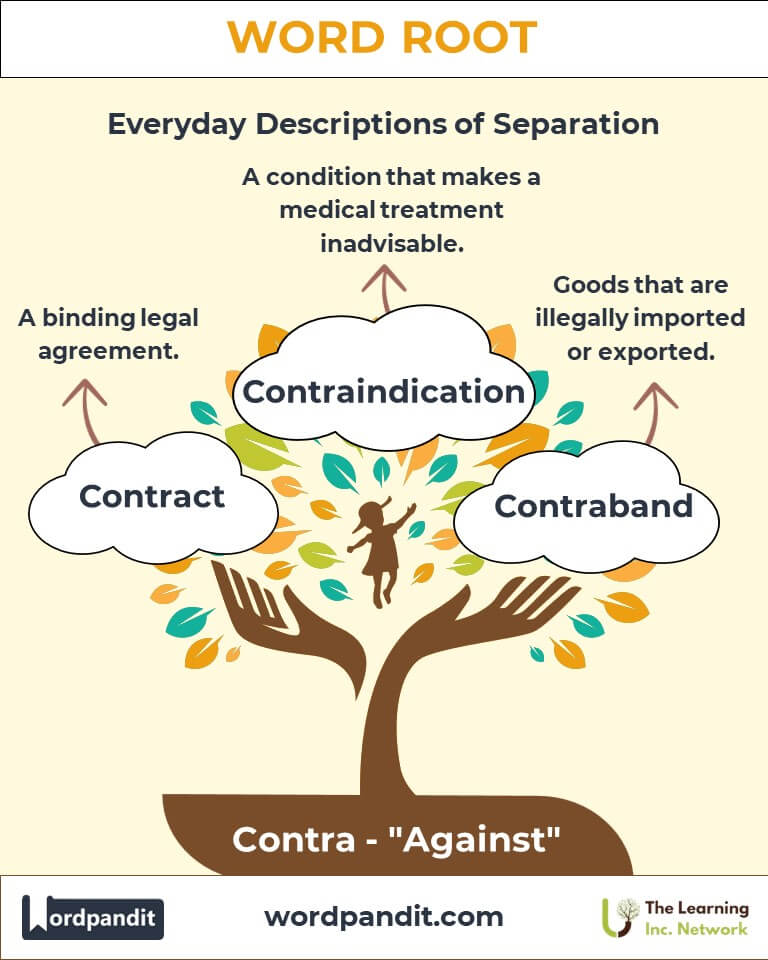Contra: The Root of Resistance and Contradiction
Discover how the Latin root "Contra," meaning "against," shapes a wide range of words expressing opposition, debate, and defiance. From "contradict" to "contrary," delve into its rich applications in language and culture.

Table of Contents
- Introduction: The Power of "Contra"
- Etymology and Historical Journey
- Mnemonic: Unlocking the Power of "Contra"
- Common "Contra"-Related Terms
- "Contra" Through Time
- "Contra" in Specialized Fields
- Illustrative Story: "Contra" in Action
- Cultural Significance of the "Contra" Root
- The "Contra" Family Tree
- FAQs about the "Contra" Word Root
- Test Your Knowledge: "Contra" Mastery Quiz
- Conclusion: The Dynamic Legacy of "Contra"
1. Introduction: The Power of "Contra"
When was the last time you encountered a debate or faced an opposing view? The Latin root "Contra," pronounced "kahn-trah," means "against" and serves as a cornerstone for words describing conflict, resistance, and contrast. From common words like "contradict" to fields like law and debate, "Contra" emphasizes the dynamic interplay of opposition in language and thought.

2. Etymology and Historical Journey
The root "Contra" comes from Latin, where it directly means "against" or "opposite." It was a term of military strategy in ancient Rome, often signifying a stance against an enemy. Over centuries, "Contra" evolved to represent intellectual, philosophical, and linguistic oppositions, becoming integral to English through Old French influences during the Middle Ages.
3. Mnemonic: Unlocking the Power of "Contra"
Visualize a tennis match where two players stand "contra" each other, representing opposition in a friendly yet determined way.
Mnemonic Device: "Contra creates contrast—always on the opposing side!"
4. Common "Contra"-Related Terms
- Contrary (kon-trer-ee): Opposite in nature or character.
Example: "Her views are contrary to popular opinion." - Contradict (kon-truh-dikt): To state the opposite of what someone else has said.
Example: "His testimony contradicted the evidence." - Contract (kon-trakt): A binding agreement (also, to draw together, as in muscles contracting).
Example: "We signed a contract to finalize the deal." - Contraband (kon-truh-band): Goods that are illegally imported or exported.
Example: "The ship was seized for carrying contraband items." - Contrast (kon-trast): The state of being strikingly different.
Example: "The painting’s vibrant colors contrast beautifully with the dark frame."
5. "Contra" Through Time
- Contrapasso (Dante’s Inferno): A concept from the 14th century describing a punishment that contrasts or opposes the sin committed.
- Contract Law (17th Century): Initially describing mutual obligations, the term expanded in legal use to emphasize opposition to breaching agreements.
6. "Contra" in Specialized Fields
- Medicine:
Contraindication: A condition or factor that makes a medical treatment inadvisable.
Example: "Allergies can serve as a contraindication for certain medications." - Law:
Contract: An agreement enforceable by law.
Relevance: Central to legal systems worldwide. - Technology:
Contrasting Algorithms: Used to analyze differences between data sets.
Example: "AI often uses contrasting algorithms to improve decision-making."
7. Illustrative Story: "Contra" in Action
In a bustling courtroom, attorney Clara had to contradict the opposition’s claims during a heated trial. Armed with a watertight contract and evidence of contraband activities, she skillfully demonstrated the contrast between the accused's statements and the facts. Clara's ability to navigate through "Contra" terms won the case, proving the power of strategic opposition.
8. Cultural Significance of the "Contra" Root
The concept of "Contra" is woven into global traditions, from debates that sharpen critical thinking to art forms like chiaroscuro, where contrasting light and shadow create dramatic effects. "Contra" also appears in iconic phrases like "Devil's Advocate," symbolizing constructive opposition.

9. The "Contra" Family Tree
- Anti- (against):
- Antibiotic: Against bacteria.
- Antithesis: Direct opposite.
- Ob- (opposite):
- Objection: An opposing argument.
- Obstacle: Something that blocks progress.

10. FAQs About the "Contra" Word Root
Q: What does "Contra" mean?
A: The root "Contra" means "against" or "opposite." It is derived from Latin and is often used to describe conflict, resistance, or contrast. Examples include "contrary" and "contradict."
Q: Is "Contra" always negative in meaning?
A: Not necessarily. While "Contra" implies opposition, it often fosters constructive dialogue and resolution. For instance, contracts highlight mutual agreement despite opposing interests.
Q: What is a contraindication in medicine?
A: A contraindication is a specific factor or condition that makes a treatment or procedure inadvisable. For instance, certain medications are contraindicated for patients with allergies.
Q: What does "Contraband" mean?
A: Contraband refers to goods that are prohibited by law from being traded, imported, or exported. Examples include smuggled items or counterfeit products.
Q: How does "Contra" differ from "Anti"?
A: Both roots convey opposition, but "Contra" suggests a direct clash or contrast (e.g., contradict), while "Anti" often implies prevention or negation (e.g., antibiotic).
Q: What does "Contrast" mean?
A: "Contrast" highlights the state of being strikingly different. It is widely used in art, writing, and speech to emphasize distinctions, such as contrasting colors in a painting.
Q: What role does "Contra" play in legal language?
A: In law, "Contra" is central to terms like "contract" (a binding agreement) and "contradiction" (opposing evidence). It underscores balancing conflicting interests.
Q: Can "Contra" be found in philosophical terms?
A: Yes, "Contra" is significant in philosophy. Terms like "contradiction" are crucial in dialectics, where opposing ideas are explored to develop deeper understanding.
11. Test Your Knowledge: "Contra" Mastery Quiz
1. What does the root "Contra" signify?
2. Which term describes a binding legal agreement?
3. What does "Contradict" mean?
4. What is a contraindication in medicine?
5. Which word means illegal goods?
12. Conclusion: The Dynamic Legacy of "Contra"
The root "Contra" encapsulates the essence of opposition and balance, serving as a linguistic bridge between conflict and resolution. Its applications in everyday speech, specialized fields, and cultural expressions highlight its timeless relevance. As debates, contrasts, and contradictions shape our understanding of the world, "Contra" remains a vital force in communication and thought.














